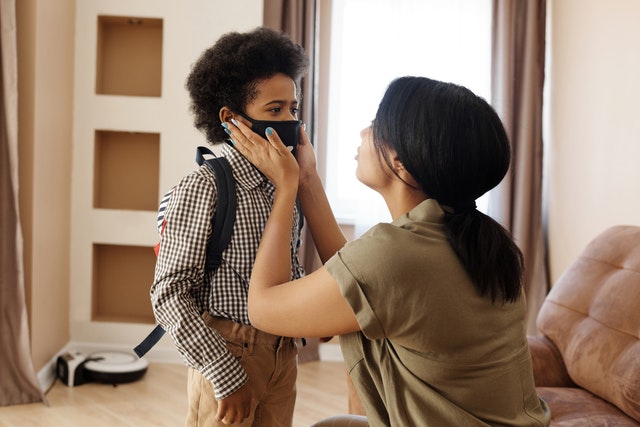COVID Safety Tips for Kids

The coronavirus has many parents concerned about how to keep their children safe and healthy, especially as the school year approaches. Here are 5 tips on how to teach safety and good hygiene to your kids. Subscribe below to receive free weekly educational content on all things related to speech, language, and child development.
Read social stories.
Social stories are a great way to teach sensitive topics to children, help them cope with a difficult situation, and ease their fear and anxiety. There are many wonderful social stories available online that explain the coronavirus, social distancing, and wearing masks. Find a social story online or use one of the stories provided below. Read the story aloud to your children and make sure to leave time after the story for them to ask questions and discuss the social story with you. Children are naturally curious and want to know what is going on in the world around them.
Create fun and colorful PPE.
Children love to decorate and personalize what they own. Allowing them to decorate their mask or face shield can encourage them to wear this personal protective equipment (PPE) and ease any fears they might have about the coronavirus. Choose masks in fun colors and patterns, add stickers to face shields, and wear princess tiaras or hard hats along with their other personal protective equipment. This can help make PPE feel less clinical and sterile and more like a costume for young children. The links below give you some fun ways to wear PPE.
Develop new routines related to health and safety.
Routines are an important way to create structure in the home and help children develop new habits in their everyday life. To help children learn to sanitize, establish new routines such as washing hands before eating, after coughing or sneezing, and when coming into the home from outside. Children can sing fun songs while they wash hands to make sure they are completely disinfecting for at least 20 seconds.
Other routines for children might include new ways to greet loved ones. Instead of hugging, kissing, and high-fiving, children can find creative non-contact ways to greet others. That might include waving, bowing, curtsying, saluting, or blowing “air kisses” to show affection and love to others.
Give your child a job.
Children LOVE jobs! They love to take on responsibilities and be helpful to others. Ask them to pack hand sanitizer for each trip out of the house. Have them put a mask on their teddy bear or stuffed animal to protect it from germs. They can even remind other immediate family members to wash hands and wear masks. You may find them reminding you to wash hands too! This is an important time to teach your child social responsibility and contributing to help others. Make sure to praise your child for doing his or her part.
Set a good example.
Your children will be watching your habits, reactions, and conduct during the coronavirus. They will look to you for guidance on how to act and respond during this challenging time. Make sure your habits reflect what you want your children to see and do. You can encourage valuable attributes like resiliency, flexibility, and positivity during adversity, which are some of the most important qualities that we can teach children. Studies show that resiliency leads to improved learning, reduced risk-taking behavior, and increased physical health. I cannot think of a more important lesson that children can learn right now than resilience.
This is a time of uncertainty for many families. Through education, positivity, and a little creativity, we can make sure that children are safe and responsible during this challenging time.
